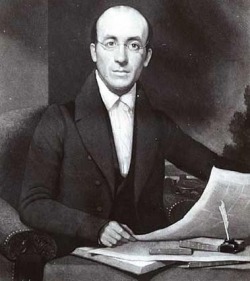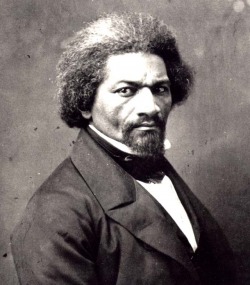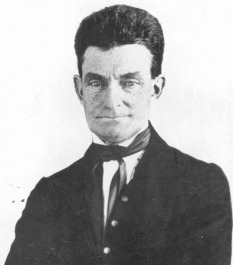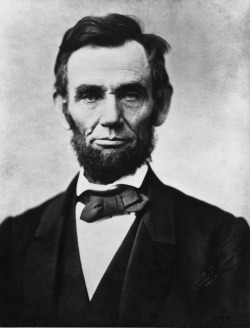The Abolitionist Movement
As displayed by the examples below, abolitionism was a cause taken on by many individuals. The reasons behind each individual's support for abolitionism are different for each person, but nonetheless, abolitionism was a powerful force during the antebellum period; one that the South would not stand for.

William Lloyd Garrison, The Liberator Creator
"Assenting to the 'self-evident truth' maintained in the American Declaration of Independence, 'that all men are created equal, and endowed by their Creator with certain inalienable rights -- among which are life, liberty and the pursuit of happiness,' I shall strenuously contend for the immediate enfranchisement of our slave population. In Park-Street Church, on the Fourth of July, 1829, I unreflectingly assented to the popular but pernicious doctrine of gradual abolition. I seize this moment to make a full and unequivocal recantation, and thus publicly to ask pardon of my God, of my country, and of my brethren the poor slaves, for having uttered a sentiment so full of timidity, injustice, and absurdity. A similar recantation, from my pen, was published in the Genius of Universal Emancipation at Baltimore, in September, 1829. My conscience is now satisfied."
- William Lloyd Garrison, Opening Editorial of the Liberator
- William Lloyd Garrison, Opening Editorial of the Liberator

Frederick Douglass, Runaway Slave
"What, am I to argue that it is wrong to make men brutes, to rob them of their liberty, to work them without wages, to keep them ignorant of their relations to their fellow men, to beat them with sticks, to flay their flesh with the lash, to lead their limbs with irons, to hunt them with dogs, to sell them at auction, to sunder their families, to knock out their teeth, to burn their flesh, to starve them into obedience and submission to their masters? Must I argue that a system thus marked with blood, and stained with pollution, is wrong?"
- Frederick Douglass, Fourth of July Speech
- Frederick Douglass, Fourth of July Speech

Radical Abolitionist John Brown, Slave Upriser
"I see a book kissed here which I suppose to be the Bible, or at least the New Testament. That teaches me that all things whatsoever I would that men should do to me, I should do even so to them. It teaches me, further, to 'remember them that are in bonds, as bound with them.' I endeavored to act up to that instruction. I say I am yet too young to understand that God is any respecter of persons. I believe that to have interfered as I have done--as I have always freely admitted I have done--in behalf of His despised poor was not wrong, but right. Now, if it is deemed necessary that I should forfeit my life for the furtherance of the ends of justice, and mingle my blood further with the blood of my children and with the blood of millions in this slave country whose rights are disregarded by wicked, cruel, and unjust enactments--I submit; so let it be done!"
- John Brown, Speech to the Court at his Trial
- John Brown, Speech to the Court at his Trial

Abraham Lincoln, Republican President of the Union
"Executive Mansion,
Washington, August 22, 1862. Hon. Horace Greeley:
Dear Sir.
I have just read yours of the 19th. addressed to myself through the New-York Tribune. If there be in it any statements, or assumptions of fact, which I may know to be erroneous, I do not, now and here, controvert them. If there be in it any inferences which I may believe to be falsely drawn, I do not now and here, argue against them. If there be perceptable in it an impatient and dictatorial tone, I waive it in deference to an old friend, whose heart I have always supposed to be right.
As to the policy I "seem to be pursuing" as you say, I have not meant to leave any one in doubt.
I would save the Union. I would save it the shortest way under the Constitution. The sooner the national authority can be restored; the nearer the Union will be "the Union as it was." If there be those who would not save the Union, unless they could at the same time save slavery, I do not agree with them. If there be those who would not save the Union unless they could at the same time destroy slavery, I do not agree with them. My paramount object in this struggle is to save the Union, and is not either to save or to destroy slavery. If I could save the Union without freeing any slave I would do it, and if I could save it by freeing all the slaves I would do it; and if I could save it by freeing some and leaving others alone I would also do that. What I do about slavery, and the colored race, I do because I believe it helps to save the Union; and what I forbear, I forbear because I do not believe it would help to save the Union. I shall do less whenever I shall believe what I am doing hurts the cause, and I shall do more whenever I shall believe doing more will help the cause. I shall try to correct errors when shown to be errors; and I shall adopt new views so fast as they shall appear to be true views.
I have here stated my purpose according to my view of official duty; and I intend no modification of my oft-expressed personal wish that all men every where could be free.
Yours,
A. Lincoln."
- Abraham Lincoln, Letter to Horace Greeley
Washington, August 22, 1862. Hon. Horace Greeley:
Dear Sir.
I have just read yours of the 19th. addressed to myself through the New-York Tribune. If there be in it any statements, or assumptions of fact, which I may know to be erroneous, I do not, now and here, controvert them. If there be in it any inferences which I may believe to be falsely drawn, I do not now and here, argue against them. If there be perceptable in it an impatient and dictatorial tone, I waive it in deference to an old friend, whose heart I have always supposed to be right.
As to the policy I "seem to be pursuing" as you say, I have not meant to leave any one in doubt.
I would save the Union. I would save it the shortest way under the Constitution. The sooner the national authority can be restored; the nearer the Union will be "the Union as it was." If there be those who would not save the Union, unless they could at the same time save slavery, I do not agree with them. If there be those who would not save the Union unless they could at the same time destroy slavery, I do not agree with them. My paramount object in this struggle is to save the Union, and is not either to save or to destroy slavery. If I could save the Union without freeing any slave I would do it, and if I could save it by freeing all the slaves I would do it; and if I could save it by freeing some and leaving others alone I would also do that. What I do about slavery, and the colored race, I do because I believe it helps to save the Union; and what I forbear, I forbear because I do not believe it would help to save the Union. I shall do less whenever I shall believe what I am doing hurts the cause, and I shall do more whenever I shall believe doing more will help the cause. I shall try to correct errors when shown to be errors; and I shall adopt new views so fast as they shall appear to be true views.
I have here stated my purpose according to my view of official duty; and I intend no modification of my oft-expressed personal wish that all men every where could be free.
Yours,
A. Lincoln."
- Abraham Lincoln, Letter to Horace Greeley
